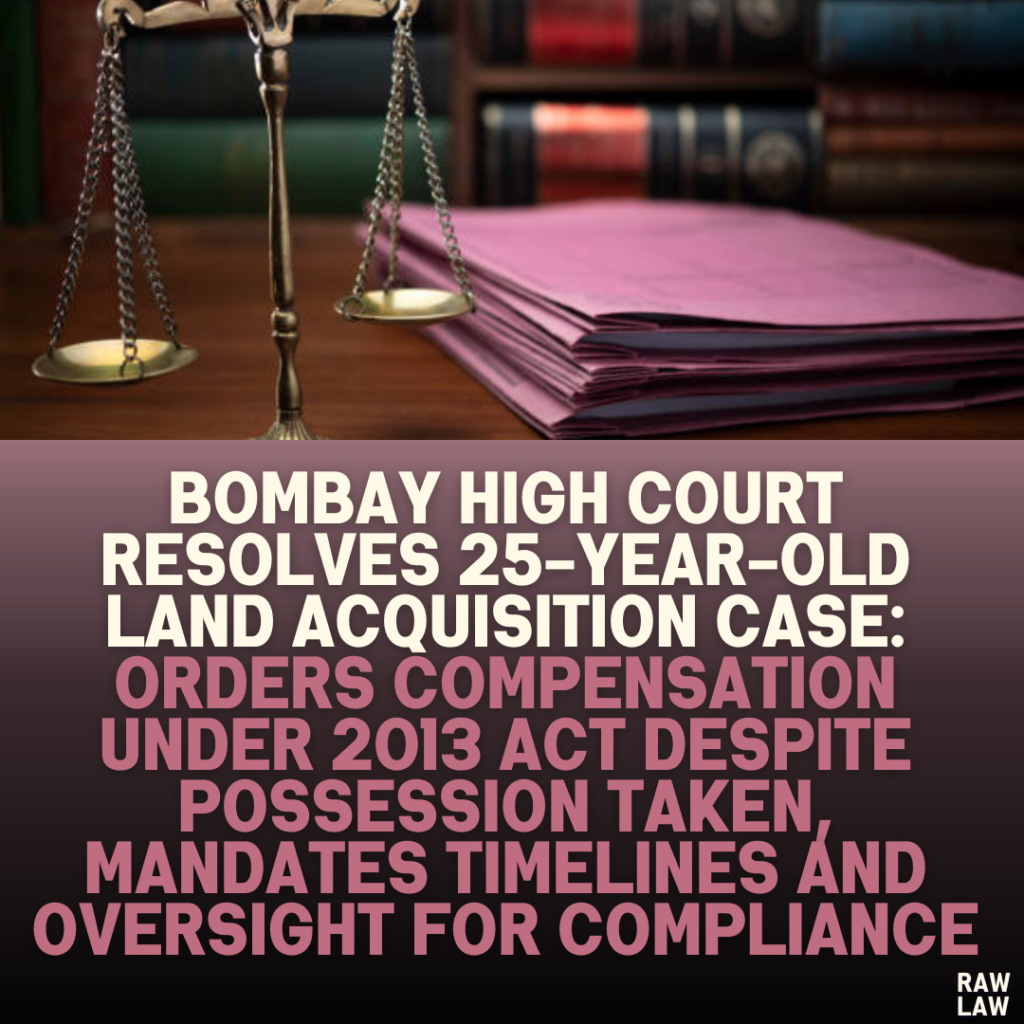Court’s Decision
The Bombay High Court directed the respondents, including the state authorities, to compute and pay compensation to the petitioners under the Right to Fair Compensation and Transparency in Land Acquisition, Rehabilitation, and Resettlement Act, 2013 (the 2013 Act). The court specified that:
- Computation Deadline: The respondents must compute the compensation amount within three months.
- Payment Deadline: Payment of compensation, along with all consequential benefits under the 2013 Act, must be made within two months of the computation.
- Compliance Report: The respondents are required to file a compliance report with the court, ensuring the timelines are adhered to.
The court underscored that the petitioners, who had already been deprived of their land in 2018, cannot be made to wait indefinitely for compensation.
Facts
- The petitioners owned lands in Kolhapur, Maharashtra, which were acquired for the Chitri Project under the Maharashtra Project Affected Persons Rehabilitation Act, 1989.
- Notifications under the Land Acquisition Act, 1894, were issued:
- Notification under Section 4: March 16, 1996.
- Notification under Section 6: July 2, 1997.
- An award for the acquisition was made on April 16, 1999, but no compensation was paid, and the physical possession of the land was taken in 2018.
- Initially, the petitioners sought a declaration that the acquisition proceedings had lapsed under Section 24(2) of the 2013 Act. However, following the Supreme Court’s decision in Indore Development Authority v. Manoharlal, they amended their petition to seek compensation under the 2013 Act.
Issues
- Did the acquisition proceedings lapse under Section 24(2) of the 2013 Act due to non-payment of compensation or failure to take possession?
- Are the petitioners entitled to compensation under the 2013 Act despite the acquisition proceedings continuing under the Land Acquisition Act, 1894?
Petitioner’s Arguments
- Lapse of Acquisition: The petitioners argued that under Section 24(2) of the 2013 Act, acquisition proceedings would lapse if:
- Compensation was not paid, or
- Physical possession was not taken within five years of the 2013 Act’s commencement.
- Entitlement Under the Proviso: The petitioners contended that even if the acquisition had not lapsed, they were entitled to compensation under the 2013 Act, as the majority of the land holdings remained uncompensated.
- Precedent Reliance: They relied on the Supreme Court’s decision in Indore Development Authority and the Bombay High Court’s decision in Shital Anna Walawade v. State of Maharashtra.
Respondent’s Arguments
- Possession Taken: The respondents claimed that possession of the land was taken in 2018, and thus, the acquisition did not lapse.
- Compensation Delay: They admitted that compensation was delayed because the acquiring body failed to deposit the amount with the state government. However, they acknowledged the petitioners’ entitlement to compensation under the 2013 Act.
Analysis of the Law
- Section 24(2) of the 2013 Act:
- This provision states that acquisition proceedings initiated under the Land Acquisition Act, 1894, will lapse if:
- Compensation was not paid, and
- Physical possession was not taken within five years prior to the 2013 Act’s commencement.
- In Indore Development Authority, the Supreme Court clarified that both conditions must be met for the acquisition to lapse. Here, since possession was taken, the acquisition had not lapsed.
- This provision states that acquisition proceedings initiated under the Land Acquisition Act, 1894, will lapse if:
- Proviso to Section 24(2):
- The proviso states that if a majority of the land holdings remain uncompensated, the beneficiaries are entitled to compensation under the 2013 Act.
- As per the Supreme Court in Indore Development Authority, the proviso applies if:
- No compensation was paid, and
- A majority of the land was acquired but remained uncompensated.
- This applied to the petitioners, who owned the majority of the land (4.87 hectares out of 5.20 hectares).
Precedent Analysis
- Indore Development Authority v. Manoharlal:
- Clarified that “or” in Section 24(2) should be read conjunctively, meaning both conditions (non-payment and non-possession) must be met for lapsing.
- Affirmed that the proviso to Section 24(2) entitles landowners to compensation under the 2013 Act if a majority of land remains uncompensated.
- Shital Anna Walawade v. State of Maharashtra:
- Applied the proviso to Section 24(2) to direct compensation under the 2013 Act when compensation was not paid before April 1, 2014.
Court’s Reasoning
- No Lapse: Since possession was taken in 2018, the acquisition proceedings had not lapsed under Section 24(2).
- Proviso Applicability: The court held that the proviso to Section 24(2) applied as no compensation had been paid for the majority of the acquired land.
- Entitlement to Compensation: Based on the proviso and the precedents cited, the petitioners were entitled to compensation under the 2013 Act.
Conclusion
The court:
- Directed the respondents to compute compensation under the 2013 Act within three months.
- Ordered payment of compensation, along with consequential benefits, within two months thereafter.
- Required a compliance report to ensure adherence to the timelines.
Implications
- Reinforces Landowners’ Rights: This ruling strengthens the rights of landowners to fair compensation under the 2013 Act.
- Judicial Oversight: The court’s insistence on a compliance report ensures timely implementation of its directions, addressing long-standing grievances in land acquisition cases.
- Precedential Value: The decision reaffirms the conjunctive reading of Section 24(2) and the applicability of its proviso in ensuring justice for affected landowners.
